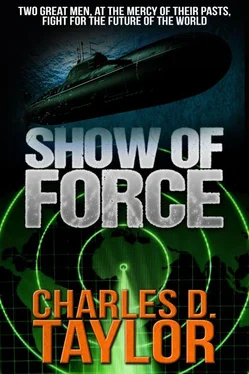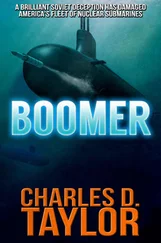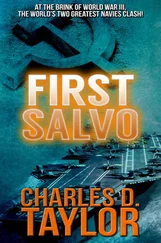When Admiral Gorenko was shown the meaningless message sent by Carter to the American task force, he lost his temper. He raged first at the communications officer, who was equally puzzled, and then at his whole staff. The message read: WHERE IS RPT WHERE IS TASK FORCE THIRTY-FOUR RR THE WORLD WONDERS.
DEAR SAM,
Since I haven't seen you for two days (almost), and I thought you were finally desk bound and my days of waiting for ships was over, I decided I'd better write you this note if you came home. Since you're always so good about turning out the lights, I knew you'd find it here.
I want you to wake me up when you come in. Maria Charles talked with me for a while today about what you're all involved in, and she's awfully worried. I know if we could talk about it for a few minutes, I'd be able to put her mind at ease. There I go again, back to being the wife of the ship's captain and taking care of the flock while the wardroom goes off across the briny.
I've heard enough on the radio and the TV this evening to know that something very big is happening halfway around the world, and Maria's afraid David's right in the middle of it. She even reminded me of that dumb promise you made to her at the wedding when you said you'd keep him out of trouble from that time on. I think you had to be flying high to make that promise, but she's sincere about it, so I said I'd talk with you. Before you fly off the handle, I didn't promise anything. I said that sometimes, as wonderful as she thinks you are, you can't control absolutely everything the Navy does and that even you might not have control over everything David does. I hope that made things a bit easier for her to take if he is there, but you better not let us down too much!
Now I didn't intend to write a letter since you're just downstairs reading it, but I got carried away since you've become a dry-land admiral and come home most every night. See, I haven't forgotten how to write. You'd get some great love letters from me if you were still at sea. As a matter of fact, once you wake me up, there's other things to do after our little talk.
All my love and kisses, Ann
Captain Svedrov wasn't absolutely certain whether he was concerned more about the coming battle or.about the priorities Admiral Kupinsky had established. He knew of the short, simple message Gorenko had sent and realized there was nothing Alex could do but make Nimitz the number-one priority.
Svedrov sat before his desk in his cabin, a place he had rarely visited in the last forty-eight hours. He was tired, but he knew sleep would not come, not when contact with the American forces was imminent. He had read and reread the order of battle they had promulgated only thirty minutes before. The airwing commanders had joined in the briefing in flag plot, while the captains of the other ships had taken part by direct TV hookup. Electronic access was so simple that they were literally present.
Svedrov had to' agree with the commanding officer of the Azov. Admiral Kupinsky's presentation was one of the most stirring any of the senior officers had ever been privileged to witness. He had quietly begun the meeting with a moment of silence for their fallen comrades, an action with almost religious overtones that most Soviet officers wouldn't have dared do. Then he reviewed the purpose for their being in that section of the Indian Ocean, and the reason that the Americans were there. There was no doubt in his mind, he continued, that Admiral Charles and his people were probably having the same type of conference at this time and that they intended to persevere just as the Russians would. It would not be an easy day. Quite obviously, more ships and men would be lost. Then he stopped for a moment, just long enough for them to hang on to his next words.
It was a story that many of them were not familiar with, but Svedrov had heard it before. It was about a young Soviet submariner back in October of 1962, a time when most of those listening had not yet crossed the brow of their first ship. Admiral Kupinsky assured them that it was just as well, for October 1962 was one of the darkest periods for the emerging Soviet Navy. Russia had been in the process of becoming a blue-water naval power, the only way a major nation could survive as a leader in the twentieth century. But, and this was an important point, she did not then have the sophistication of the U.S. Navy. Many of the ships were not ready for the challenge, and suddenly they were facing an America with the determination to drive them out of Cuban waters. The Soviet subs had neither the fuel nor repair facilities necessary to project this power. As a result, the United States had dominated.
Then he finished with the story of the Russian submarine that had been surfaced by an old wreck of a destroyer, a relic of World War II, and the, resultant humiliation. He rose from the long table, pacing back and forth before them as he spoke, their eyes riveted attentively. He kept his hands locked behind his back, looking each man in the eye, even gazing directly into the cameras that carried this meeting to the other ships. And finally, he announced to his listeners that Admiral David Charles, the commander of this Task Force 58, had been on that destroyer that day the Soviet submarine had been humiliated before the world. And now, he explained to them both as individuals and as a group, it was their opportunity to turn the tables.
Svedrov looked over his notes of that meeting, but he didn't need them now. He had written the order of battle for his Admiral, and he had explained it at that meeting. Immediately on completing his speech, Kupinsky had turned the meeting over to Svedrov. There was nothing complex about what he had explained to them. The main objective was to sink Nimitz. That would curtail American airpower and allow the surface ships a better opportunity to close and engage their opposite numbers with missiles. And to everyone's surprise, he called upon three new service ships of a rather unusual design to move up with the main force. But no one felt privileged enough to ask the reason for these noncombatants to hazard themselves.
Captain Svedrov folded the papers neatly and placed them in the small desk safe, twirling the wheel a few times to make sure it was locked and secure. He changed into a clean uniform, as he knew his Admiral would be doing at this point. They would present a fine, almost urbane appearance to their staff, and the word would spread through the force that Admiral Kupinsky and his Captain Svedrov looked as though they were on holiday in Leningrad, preparing for a stroll through the Gardens of the Summer Palace.
He found Admiral Kupinsky leaning on the railing on the port-side catwalk above the flight deck, watching the launch. Lenin was unlike an American carrier, for the VTOL planes simply lifted off the deck vertically, pointing their noses first down slightly, then upward as their powerful single jet engines increased thrust for takeoff. It was noisy but had none of the drama of the American launch, with the planes being flung violently forward, steam hissing and catapults slamming into their stops.
But Alex Kupinsky saw drama in this event. Two mighty oceangoing forces were about to engage each other for the first time in forty years. The previous engagements by aircraft or submarines were simply softening-up exercises, feeling out the opposition. This would be truly a three-dimensional battle, air, surface, and undersea all at once. Continents were at stake. One country should emerge a victor without a land battle. Men and ships were immaterial in the face of national goals. It was sad in a way that time had brought this disregard of human life and that political ambitions overrode human consideration.
Читать дальше












